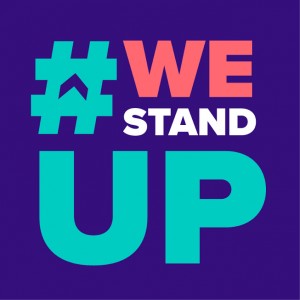We Help Podcast: Ep. 2 #WeStandUp

Each April since 2001, the National Sexual Violence Resource Center has organized Sexual Assault Awareness Month (SAAM) to bring attention to the nearly one in five women and one in 71 men who are the victims of rape. The month is observed with educational events, media campaigns and fundraisers to help end sexual violence in the United States through greater awareness and prevention. As part of Social Work License Map’s monthlong #WeStandUp series dedicated to empowering survivors of sexual assault, this installment of the “We Help” podcast examines the role of social workers in helping their clients overcome sexual violence and trauma.
Annie is a 24-year-old Asian-American who was repeatedly sexually abused in childhood. It was only in middle school, in the degrading context of “rape jokes,” that Annie began to understand what had happened to her. As she explained to “We Help” host Arly Nguyen, “I just remember looking back and thinking, ‘What they’re describing … is something that happened to me.’”
Having this stark realization but not knowing what to do with it, Annie fell into a depression. She confided in a counselor who caught her crying in school and who then informed her mother of the situation, but that led to little reconciliation and much more shame. Feeling betrayed, Annie avoided any further therapy until college when her depression and self-destructive behavior made seeing a social worker seem like the only option.
“What she did was what I wanted my mom to do,” Annie said of the social worker who listened to her story while reassuring her of her innocence and of her strength. “I don’t know for how long I didn’t love myself, but for the first time I felt like there was something worth living for.”
Annie shared this story with the help of Josie Torielli, a licensed clinical social worker from the New York City Alliance Against Sexual Assault. Throughout Annie’s interview with “We Help,” Torielli asked questions, sympathized and helped Annie contextualize her feelings, thoughts and behavior.
“What really stands out to me in Annie’s story is her reclaiming the narrative,” says Torielli in the second part of the podcast.
She emphasized that reclamation is a necessary step for victims of sexual violence to absolve themselves of the guilt that too often plagues them. Torielli pointed out the absence of Annie’s assailants in her story – a sign that Annie unfairly carries the blame for everything that happened. Paradoxically, therapy can unintentionally reinforce the dynamics of victim blaming by focusing questions solely on the client, his or her behavior and his or her motivations rather than those of the perpetrator.
“One of the things that’s going to get us to a place where we’re actually solving the issue is if we can shift our focus from victims and from asking about their actions to figuring out perpetrators and delving into their actions,” Torielli said.
The roles of perpetrator and victim need to be rightfully set, but reclaiming a narrative is also about allowing clients to define themselves beyond their victimization.
“The abuse that happened is not the only part of the person,” Torielli said. “That certainly shapes who they are, but doesn’t define who they are.” The narrative must of course include the abuse, but it shouldn’t end there.
Reclaiming their narratives may be a useful step for the survivors of sexual violence to take, but it isn’t an easy one. As Annie’s interview illustrated, the trauma of sexual assault may lay dormant for years, emerging only to expose survivors to skepticism and even scorn from the people around them. This atmosphere further silences victims and makes it all the more important that sexual assault social workers provide their clients with the safety and confidence necessary for them to take the first step: the act of disclosure.
And it is only the first step. The road to recovery from sexual assault can be long, if not lifelong. The circumstances of sexual violence and the current atmosphere surrounding it, from laws to stigma, can make the victim’s plight a particularly grueling one. It begins with sharing, but from there can take any number of routes, from reassessing relationships to pursuing criminal charges to establishing support networks. It’s imperative that social workers not only offer these clients the resources and services that any other clients would receive, but also nurture what may be a very fragile hope of recovery.
As Annie’s story makes clear, and as Annie and Torielli demonstrate throughout their interview, the role of a sexual assault social worker can be akin to a lifeboat set on the dark sea. The communication, support, and understanding that social workers are so adept at providing are precisely the services that victims of sexual violence need and cannot find elsewhere. But whether for reasons of shame or fear or unawareness, the drowning don’t always reach the lifeboat. Sexual Assault Awareness Month is about changing that and about buoying the survivors of sexual violence until they can sail again.
Episode 2: #WeStandUp
For sexual assault social workers looking to learn more about resources and services that may be of help to their clients, we recommend the following organizations:
- Rape, Abuse & Incest National Network Phone Number: 800-656-4673
- New York City Alliance Against Sexual Assault Phone Number: 212-514-7233
- The National Domestic Violence Hotline Phone Number: 800-799-7233
- Love is Respect Phone Number: 866-331-8453
- Casa de Esperanza Phone Number: 800-799-7233
- ChildHelp Phone Number: 800-422-4453
- Planned Parenthood Phone Number: 800-230-7526
- Peace Over Violence Phone Number: 626-793-3385
- 1 in 6 Phone Number: 800-273-8255
Educational Resources:

